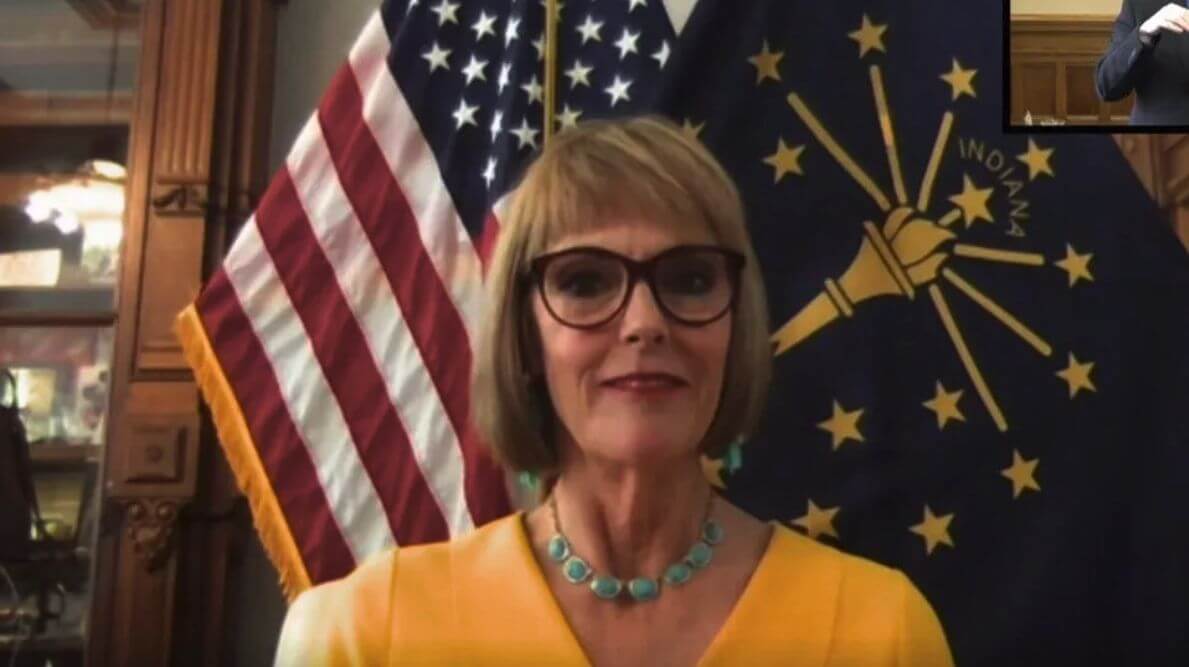8/21 Torchbearer Weekly Policy Update
Welcome back! We hope you enjoyed your weekend. Thank you for allowing us to be your trusted source for news at the local, state, and federal levels.
Local, state, and federal highlights in this week’s memo include:
- DEEP DIVE: SEA 8
- Lt. Gov Calls for Universal Pre-K
- Former Secretary of Commerce Announces Run for Governor
- David Rosenberg Tapped to Lead IEDC
- Indiana Continues to Report Poor IREAD Scores
- CSA Applications Open Monday
- IRA - One Year Later
- Federal Judge Rules on 2% Election Law
- Share the Torchbearer Newsletter with Your Network!
- Important Dates
Let’s dive in.
DEEP DIVE: SEA 8

Deep dive: The goal of SEA 8 is to promote competition in healthcare. Insurance companies often negotiate contracts with drug companies so they get a rebate every time a person covered by their plan gets certain prescriptions. SEA 8 require insurers to pass on the rebates they receive for prescriptions to the patients buying the medicines or to all plan members.
SEA 8 makes the following changes:
- Requires a pharmacy benefit manager to provide a report to the department of insurance at least every six months.
- Provides that the report must include the: (1) overall aggregate amount charged to a health plan for all pharmaceutical claims processed by the pharmacy benefit manager; and (2) overall aggregate amount paid to pharmacies for claims processed by the pharmacy benefit manager.
- Requires that, for individual health insurance coverage, the defined cost sharing for a prescription drug be calculated at the point of sale and based on a price that is reduced by an amount equal to at least 85% of all rebates in connection with the dispensing or administration of the prescription drug.
- Requires that, for group health insurance coverage, an insurer: (1) pass through to a plan sponsor 100% of all rebates concerning the dispensing or administration of prescription drugs to the covered individuals of the plan sponsor; (2) provide a plan sponsor, at the time of contracting, the option of calculating defined cost sharing for covered individuals of the plan sponsor at the point of sale based on a price that is reduced by some or all of the rebates received concerning the dispensing or administration of the prescription drug; and (3) disclose specified information to the plan sponsor.
- Allows the department of insurance to enforce the provisions and impose a civil penalty.
Lt. Gov Calls for Universal Pre-K

What’s new: Lt. Gov. Suzanne Crouch stated in an interview with Axios that if she is elected governor next year she would push lawmakers to move Indiana's state-funded pre-K program, On My Way Pre-K, toward universal access more quickly.
- "We can't get there overnight because, quite honestly, we don't have the infrastructure or the people to be able to do that," she said. "But I think, because of the importance of early childhood education to the workforce of today and tomorrow, it's important that we work towards that."
Catch up fast: Crouch is one of four Republicans seeking the GOP nomination in next year's gubernatorial primary.
- She has long been invested in the state's early childhood education system, co-authoring legislation in 2013 to establish the pilot program that aimed to provide access to high-quality pre-kindergarten experiences for kids from low-income families.
- She was serving as state auditor the following year when the Indiana General Assembly passed legislation to create the On My Way Pre-K program.
State of play: It's now available to qualified families in all 92 counties, but barriers to participation — work requirements, too few high-quality providers — have limited uptake.
- More than 6,200 children enrolled in On My Way Pre-K last year.
- A quarter of those were in Marion County.
Yes, but: Some counties had zero participants.
- Approximately 80,000 children will enter kindergarten this school year.
Zoom out: More states are moving toward universal pre-K.
- Ten states and Washington, D.C., have implemented universal preschool or at least have a universal preschool policy in place, if not yet fully implemented.
- Four more states — California, Colorado, Hawaii and New Mexico — passed laws to provide universal preschool in the past year. (Axios)
Former Secretary of Commerce Announces Run for Governor

What’s new: Former Indiana Secretary of Commerce Brad Chambers filed formal paperwork Thursday to launch his campaign for the 2024 governor.
The details: Chambers, 59, has been considered a possible candidate for the office since mid-July, when he announced he would be stepping down as head of the Indiana Economic Development Corp. effective Aug. 6. Chambers told IBJ he was considering a run for governor on July 19.
What he’s saying: “As Indiana’s secretary of commerce, the last two years, I have witnessed firsthand how important leadership, vision, urgency and aspiration are to the future of Indiana,” Chambers said in a written statement included with Thursday’s announcement. “I am running for governor because I want Hoosiers of today and Hoosiers of tomorrow to believe that Indiana offers an opportunity for an excellent life. I am ambitious in my vision for Indiana, and I look forward to talking with Hoosiers about the best way to continue making our state the envy of many.”
What’s next: Chambers joins at least four candidates in the Republican primary who have a head start in fundraising. (IBJ)
David Rosenberg Tapped to Lead IEDC

What’s new: Gov. Eric Holcomb on Tuesday announced David Rosenberg as the next CEO of the Indiana Economic Development Corp., promoting the state agency’s chief operating officer to the top job.
The details: Rosenberg, 37, will oversee a quasi-government entity that received an additional $1.2 billion in the most recent state budget to aggressively pursue economic development projects.
- Ann Lathrop, IEDC’s chief strategy officer, will continue to lead the agency’s integrated business development strategy while assuming more of the agency’s strategy-focused responsibilities, the IEDC said in a press release. Lathrop will also join Rosenberg on Gov. Holcomb’s cabinet.
What they’re saying:
- “David has been instrumental in guiding the IEDC team over the last two years, and I am confident in his ability to continue to lead the strong team and Indiana’s extraordinary economic momentum,” Gov. Holcomb said in written remarks. “Under Ann’s leadership of the IEDC’s business development team, Indiana has pivoted its focus to attracting the economy of the future. I am thrilled to have both David and Ann join my cabinet, and I know their leadership will help solidify more wins that will provide opportunities to Hoosiers for decades to come.”
- “I’m incredibly humbled and grateful to Gov. Holcomb for the opportunity to lead the IEDC and serve Hoosiers as Indiana’s next secretary of commerce,” Rosenberg said in written remarks. “Over the last two years, we’ve executed against a strategic vision that enables businesses and talent to be successful in Indiana while setting new committed capital investment records and unprecedented investments in communities throughout the state. Our focus on the economy of the future will impact generations as we ensure Indiana continues competing to win.” (IBJ)
Indiana Continues to Report Poor IREAD Scores

Indiana's third-grade reading scores are stagnating.
Driving the news: Results from this past spring's administration of the IREAD-3 exam released yesterday show that Hoosier third graders have made little progress since the pandemic disrupted education nationwide.
- Statewide, scores have flatlined over the last three years, with 81.9% of third-graders tested passing this year — up from 81.6% in 2022.
- In 2019, the last administration before the pandemic, 87.3% of students passed.
Why it matters: The test measures students' foundational reading skills, and what they'll need to succeed as they progress through school and shift from learning how to read to reading in order to learn.
Reality check: Indiana's reading proficiency rates were already in decline before the pandemic.
The big picture: The results underscore the importance of an ongoing effort to overhaul the way schools teach young children to read, aligning teaching methods and curriculum to what's being called "the science of reading."
- The state set a goal for 95% of students to be able to read by the end of third grade by 2027.
The bottom line: Jenner said it's urgent that the state makes progress more quickly or else "it will be years and years and thousands and thousands of kids," before they hit that goal. (Axios)
CSA Applications Open Monday

What’s new: Applications for Indiana’s new Career Scholarship Account program are now open to students. Starting Monday, students at state accredited public and private schools are able to apply by filling out an online form on the state’s website.
Why it matters: Career scholarship accounts, or CSAs, are part of a new law to promote work-based learning in the state. Students in grades 10 through 12 are eligible to apply for one of the approximately 1,000 accounts that will be funded this school year.
The details: Each CSA will receive $5,000 to pay for things like career coaching, navigation services, postsecondary education or training, course transportation, equipment, and certification or credentialing exams. CSAs can also be used to pay for apprenticeship programs that are registered with the U.S. Department of Labor or meet certain Indiana College Core work-based learning standards.
The bottom line: Applications to enroll in the CSA program this year will be open until Oct. 1. (WFYI)
IRA - One Year Later

Last year, the Inflation Reduction Act was signed into law — one piece of legislation central to "Bidenomics" the administration has touted in the lead-up to the presidential election.
The impact thus far: Treasury Department analysis finds the law has spurred stronger business investment, a tailwind for economic growth.
- The law, and others including the Bipartisan Infrastructure Law and the CHIPS and Science Act, unlocked billions of dollars that spurred investments in manufacturing and clean energy.
What they're saying: "There is evidence that private investment has held up especially well in recent years, despite the recent increase in interest rates, which—all else equal—would tend to slow investment rates," Treasury officials Eric Van Nostrand and Laura Feiveson write.
- The IRA, along with other Biden-era legislation, "likely explains some of that strength," the officials write.
Of note: The Treasury analysis also found that counties where IRA-related investments have been announced tended to be those where college graduation rate, employment and wages are lower.
- "These communities are poised to reap huge benefits from new investment. New plants could bring people into the labor force who have been left behind," the officials say.
The backdrop: Administration officials have been crisscrossing the country this week to tout the law's economic impact. It comes as consumers generally remain downbeat about the economy, despite improving conditions and easing inflation. (Axios)
Federal Judge Rules on 2% Election Law

What’s new: Indiana’s laws limiting ballot access for minor parties do not violate the Constitution, a federal judge has ruled.
- Judge James Sweeney handed down his decision Monday in a lawsuit filed by the Libertarian and Green parties.
The details:
- The law allows any party which receives at least 2% of the vote in the Secretary of State’s race to have automatic ballot access for the next four years.
- Any party that doesn’t receive 2% of the vote, or any independent candidate, must collect petition signatures equal to 2% of the previous Sec. of State election to get on the ballot.
- The law also requires the signatures be distributed to the state’s 92 county clerks.
What they’re saying: “The State—the body politic as it exists independently of the party-affiliated individuals who fill its offices—has no legitimate interest in shielding established parties from either outside competition or internal dissent,” Judge Sweeney wrote. “For now, under the Supreme Court’s lenient standard for state burdens on minor-party ballot access, a 2% petition requirement, even accompanied by tedious procedural burdens, is constitutionally permissible.”
Yes, but: In his ruling, Sweeney suggested he might agree with the parties but is bound by previous U.S. Supreme Court decisions that have upheld similar access laws. (Wish TV)
Share the Torchbearer Newsletter with Your Network!

Not signed up for our weekly newsletter? Sign up today!
Important Dates

Wednesday, August 23rd - State and Local Tax Review Task Force @ 10am
Wednesday, August 23rd - Health Care Cost Oversight Task Force @ 1:30pm
Wednesday, September 13th - Interim Employment and Labor Interim Study Committee @1pm
Thursday, September 14th - Drainage Task Force @ 12pm
Thursday, September 28th - Government Reform Task Force @ 10am
Tuesday, November 21st - Organization Day
Monday, January 8th - Anticipated 2024 legislative session start date
